The Security Hearing of J. Robert Oppenheimer: A Chronology
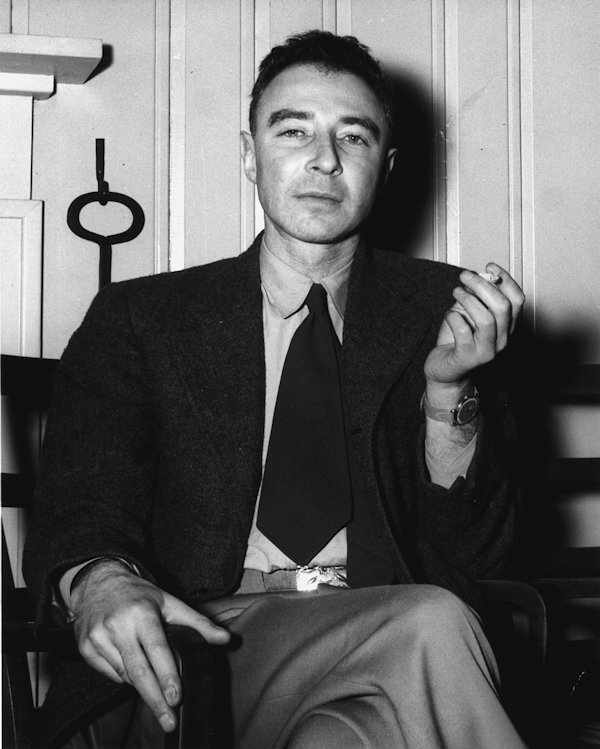
1904 April 22
Robert Oppenheimer is born in New York, New York.
1922
After being bedridden with colitis, Oppenheimer spends the summer in New Mexico to recuperating. He develops a love of horseback riding and the American Southwest.
1922
Oppenheimer enrolls at Harvard University.
1925
Oppenheimer works under physicist J. J. Thomson at Cavendish Laboratory in Cambridge, England.
1926
Oppenheimer finishes his graduate work in physics under Max Born at the University of Göttingen.
1927
Oppenheimer accepts a fellowship at Caltech and a faculty position at the University of California, Berkeley.
1930
Oppenheimer writes a paper that predicts the existence of the positron.
1934
Oppenheimer gets involved in progressive political issues, supporting longshoremen strikers and donating part of his salary to aid physicists fleeing Nazi Germany.
1936-1939
Oppenheimer is in a relationship with Jean Tatlock, who writes for a Communist Party newspaper.
1939
Oppenheimer writes a paper which predicts the existence of black holes.
1940 Nov. 1
Oppenheimer marries Katherine “Kitty” Puening, a radical Berkeley student and a former member of the Communist Party. They will have two children, a son (Peter) and a daughter (Toni).
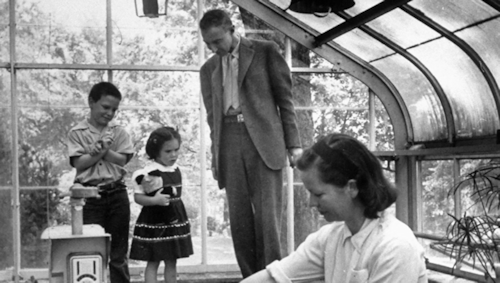
Oppenheimer and family
1941 March
The FBI opens a file on Oppenheimer.
1941 Oct. 9
Franklin Roosevelt approves a crash program to develop an atomic bomb.
1942 January
Oppenheimer directs a program on fast neutron theoretical physics at Berkeley.
1942 July
Oppenheimer puts together a study group in Berkeley to examine the principles of atomic bomb design.
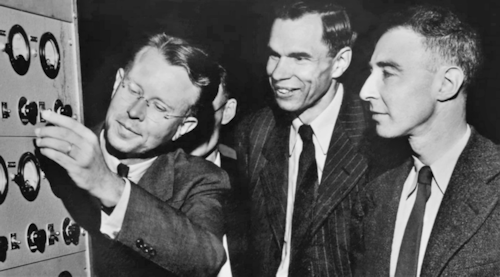
Lawrence, Seaborg, and Oppenheimer
1942 Oct. 15
General Leslie Groves asks Oppenheimer to head “Project Y,” a program to create a central laboratory for weapon research and design.
1942 Oct. 19
Oppenheimer is approved as the director for Project Y.
1942 Nov. 16
General Groves and Oppenheimer select Los Alamos as the site for the Manhattan Project.
1943 to 1945
Oppenheimer works as the director of the Los Alamos Laboratory.
1943 June
Oppenheimer spends the night at the home of his former girlfriend, Jean Tatlock.
1943 July
Oppenheimer is formally awarded the highest security clearance.
1943 August
Oppenheimer informs military security that he had been approached with information that George Eltenton had been making efforts to obtain secrets for the Soviet Union relation to the atomic bomb project of the U.S. government. He does not reveal the name of a friend, Haakon Chevalier, who asks Oppenheimer, on behalf of Eltenton, about his willingness to provide information.
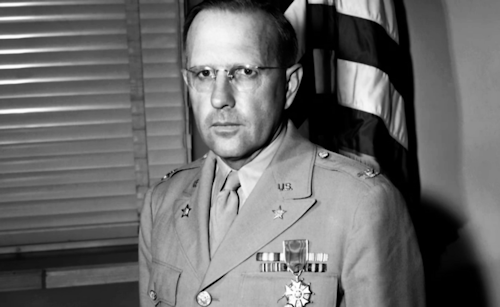
Boris Pash
1943 Aug. 26
Colonel Boris Pash interviews Oppenheimer about the Eltenton information and Oppenheimer lies about how he was approached.
1944 Fall
The Soviets begin receiving information about the Manhattan project from Klaus Fuchs, a British physicist working at Los Alamos.
1945 Jul 16
The Trinity test blast, the first attempted explosion of an atomic bomb, is successful.
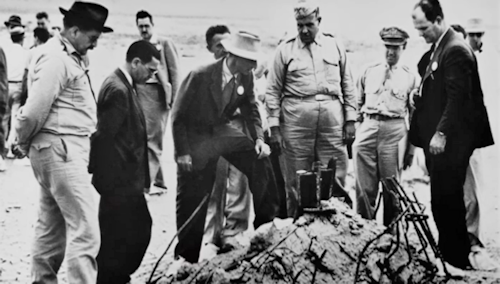
Oppenheimer inspects the Trinity blast site after test explosion
1945 Aug. 6
The bomber Enola Gay drops an atomic bomb over Hiroshima, Japan.
1945 Aug. 14
Japan surrenders.
1945 Oct 16
Oppenheimer resigns as director of Los Alamos Laboratory, and accepts a position at CalTech.
1946 March
Oppenheimer drafts a report calling for the banning of nuclear weapons and a program of international inspections to ensure compliance.
1946 June 26
FBI agents interview Haakon Chevalier and ask him about his meeting with Oppenheimer in 1943.
1946 Aug. 1
President Truman signs the Atomic Energy Act, creating the Atomic Energy Commission.
1946 Sept. 5
FBI agents interview Oppenheimer about his 1943 conversation with Chevalier.
1947
Oppenheimer becomes the director of the Institute for Advanced Study in Princeton, New Jersey.
1947 Aug. 11
The AEC gives Oppenheimer its top secret “Q” clearance.
1949 Spring
The House Un-American Activities Committee opens an investigation into atomic spying at the Berkeley Radiation Lab. Oppenheimer is called to testify.
1949 Aug. 29
The Soviet Union explodes its first atomic bomb.
1949 Oct. 28
The General Advisory Committee to the AEC, headed by Oppenheimer, decides to oppose a crash program to build a hydrogen bomb on both moral and technical grounds.
1950 Jan. 1
President Truman announces a program to explore the feasibility of building a thermonuclear bomb.
1950 Feb. 1
Klaus Fuchs, spy for the Soviets in Los Alamos, is arrested.
1952 October
The U.S. tests the world’s first hydrogen bomb in the Pacific.
1953 Feb. 17
Oppenheimer gives a major speech urging “candor” with respect to the development of nuclear weapons.
1953 May
Senator Joseph McCarthy meets with FBI Director Hoover and proposes that his Senate committee launch an investigation of Oppenheimer. Hoover asks him to hold off as the FBI continues its investigation.
1953 July
Lewis Straus, no fan of Oppenheimer, becomes chairman of the AEC.
1953 Dec. 3
After receiving a report from the FBI about Hoover, President Eisenhower directs that Oppenheimer be immediately barred from receiving any classified information. Straus asks Oppenheimer to resign his position as consultant with AEC, but he refuses.
1953 Dec. 23
Oppenheimer receives a letter from the AEC outlining charges against him. The next day, his classified papers are seized.
1954 March 5
Oppenheimer delivers a 42-page response to the charges against him to the AEC.
1954 April 12
The Oppenheimer security hearing opens in a temporary building on the Mall in Washington.
1954 June 29
Oppenheimer's security clearance is revoked by the US Atomic Energy Commission.
1963 Dec. 2
Oppenheimer receives the Enrico Fermi Award.
1967 Feb. 18
Oppenheimer dies of throat cancer at age 62 in Princeton, New Jersey.
2022 December
The Department of Energy restores Oppenheimer's security clearance, calling the 1954 revocation the result of a "flawed process."
